- Home
- William Gibson
Zero History
Zero History Read online
TITLES BY WILLIAM GIBSON
Neuromancer
Count Zero
Burning Chrome
Mona Lisa Overdrive
Virtual Light
Idoru
All Tomorrow’s Parties
Pattern Recognition
Spook Country
WILLIAM
GIBSON
zero
history
VIKING
an imprint of
PENGUIN BOOKS
VIKING
Published by the Penguin Group
Penguin Books Ltd, 80 Strand, London WC2R 0RL, England
Penguin Group (USA) Inc., 375 Hudson Street, New York, New York 10014, USA
Penguin Group (Canada), 90 Eglinton Avenue East, Suite 700, Toronto, Ontario, Canada M4P 2Y3 (a division of Pearson Penguin Canada Inc.)
Penguin Ireland, 25 St Stephen’s Green, Dublin 2, Ireland (a division of Penguin Books Ltd)
Penguin Group (Australia), 250 Camberwell Road, Camberwell, Victoria 3124, Australia
(a division of Pearson Australia Group Pty Ltd)
Penguin Books India Pvt Ltd, 11 Community Centre, Panchsheel Park, New Delhi – 110 017, India
Penguin Group (NZ), 67 Apollo Drive, Rosedale, North Shore 0632, New Zealand
(a division of Pearson New Zealand Ltd)
Penguin Books (South Africa) (Pty) Ltd, 24 Sturdee Avenue, Rosebank, Johannesburg 2196, South Africa
Penguin Books Ltd, Registered Offices: 80 Strand, London WC2R 0RL, England
www.penguin.com
First published in the United States of America by G. P. Putnam’s Sons 2010
First published in Great Britain by Viking 2010
Copyright © William Gibson Ent. Ltd., 2010
The moral right of the author has been asserted
This is a work of fiction. Names, characters, places and incidents either are the product of the author’s imagination or are used fictitiously, and any resemblance to actual persons, living or dead, businesses, companies, events or locales is entirely coincidental
All rights reserved
Without limiting the rights under copyright reserved above, no part of this publication may be reproduced, stored in or introduced into a retrieval system, or transmitted, in any form or by any means (electronic, mechanical, photocopying, recording or otherwise), without the prior written permission of both the copyright owner and the above publisher of this book
A CIP catalogue record for this book is available from the British Library
ISBN: 978-0-14-196570-3
Contents
1. CABINET
2. EDGE CITY
3. SLUT’S WOOL
4. PARADOXICAL ANTAGONIST
5. THIN ON THE GROUND
6. AFTER THE GYRATORY
7. A HERF GUN IN FRITH STREET
8. CURETTAGE
9. FUCKSTICK
10. EIGENBLICH
11. UNPACKING
12. COMPLIANCE TOOL
13. MUSKRAT
14. YELLOW HELMET
15. THE DROP
16. HONOR BAR
17. HOMUNCULI
18. 140
19. PRESENCES
20. AUGMENTED
21. MINUS ONE
22. FOLEY
23. MEREDITH
24. HUNCH
25. TINFOIL
26. MOTHER RUSSIA
27. JAPANESE BASEBALL
28. WHITE PEAR TEA
29. SHIVER
30. SIGHTING
31. SECRET MACHINERIES
32. POST-ACUTE
33. BURJ
34. THE ORDER FLOW
35. DONGLE
36. VINEGAR AND BROWN PAPER
37. AJAY
38. GETTING HOTTER
39. THE NUMBER
40. ENIGMA ROTORS
41. GEAR-QUEER
42. ELVIS, GRACELAND
43. ICHINOMIYA
44. THE VERBALS
45. SHRAPNEL, SUPERSONIC
46. TORTOISESHELL AND PINSTRIPES
47. IN THE CUISINART ATRIUM
48. SHOTGUN
49. GREAT MARLBOROUGH
50. BANK-MONUMENT
51. SOMEONE
52. THE MATTER IN GREATER DETAIL
53. CRICKET
54. AIR GLOW
55. MR. WILSON
56. ALWAYS IS GENIUS
57. SOMETHING OFF THE SHELF
58. DOUCHE BAGGAGE
59. THE ART OF THE THING
60. RAY
61. FACIAL RECOGNITION
62. WAKING
63. CURLY STAYS, SLOW FOOD
64. THREAT MANAGEMENT
65. LEOPARD SKIN IN MINIATURE
66. ZIP
67. A CRUSHED MOUSE
68. HAND-EYE
69. THE GIFTING SUITE
70. DAZZLE
71. THE UGLY T-SHIRT
72. SMITHFIELD
73. THE PATCHWORK BOYFRIEND
74. MAP, TERRITORY
75. DOWN THE DARKNETS
76. GONE-AWAY GIRL
77. GREEN SCREEN
78. EL LISSITZKY
79. DUNGEON MASTER
80. FIGURES IN A LANDSCAPE
81. ON SITE
82. LONDON EYE
83. PLEASE GO
84. NEW ONE
85. TO GET A HANDLE ON IT
86. DOILIES
87. THE OTHER SIDE
THANKS:
To Susan Allison,
my editor
1. CABINET
Inchmale hailed a cab for her, the kind that had always been black, when she’d first known this city.
Pearlescent silver, this one. Glyphed in Prussian blue, advertising something German, banking services or business software; a smoother simulacrum of its black ancestors, its faux-leather upholstery a shade of orthopedic fawn.
“Their money’s heavy,” he said, dropping a loose warm mass of pound coins into her hand. “Buys many whores.” The coins still retained the body heat of the fruit machine from which he’d deftly wrung them, almost in passing, on their way out of the King’s Something.
“Whose money?”
“My countrymen’s. Freely given.”
“I don’t need this.” Trying to hand it back.
“For the cab.” Giving the driver the address in Portman Square.
“Oh Reg,” she said, “it wasn’t that bad. I had it in money markets, most of it.”
“Bad as anything else. Call him.”
“No.”
“Call him,” he repeated, wrapped in Japanese herringbone Gore-Tex, multiply flapped and counterintuitively buckled.
He closed the cab’s door.
She watched him through the rear window as the cab pulled away. Stout and bearded, he turned now in Greek Street, a few minutes past midnight, to rejoin his stubborn protégé, Clammy of the Bollards. Back to the studio, to take up their lucrative creative struggle.
She sat back, noticing nothing at all until they passed Selfridges, the driver taking a right.
The club, only a few years old, was on the north side of Portman Square. Getting out, she paid and generously tipped the driver, anxious to be rid of Inchmale’s winnings.
Cabinet, so called; of Curiosities, unspoken. Inchmale had become a member shortly after they, the three surviving members of the Curfew, had licensed the rights to “Hard to Be One” to a Chinese automobile manufacturer. Having already produced one Bollards album in Los Angeles, and with Clammy wanting to record the next in London, Inchmale had argued that joining Cabinet would ultimately prove cheaper than a hotel. And it had, she supposed, but only if you were talking about a very expensive hotel.
She was staying there now as a paying guest. Given the state of money markets, whatever thos
e were, and the conversations she’d been having with her accountant in New York, she knew that she should be looking for more modestly priced accommodations.
A peculiarly narrow place, however expensive, Cabinet occupied half the vertical mass of an eighteenth-century townhouse, one whose façade reminded her of the face of someone starting to fall asleep on the subway. It shared a richly but soberly paneled foyer with whatever occupied the other, westernmost, half of the building, and she’d formed a vague conviction that this must be a foundation of some kind, perhaps philanthropic in nature, or dedicated to the advancement of peace in the Middle East, however eventual. Something hushed, in any case, as it appeared to have no visitors at all.
There was nothing, on façade or door, to indicate what that might be, no more than there was anything to indicate that Cabinet was Cabinet.
She’d seen those famously identical, silver-pelted Icelandic twins in the lounge, the first time she’d gone there, both of them drinking red wine from pint glasses, something Inchmale dubbed an Irish affectation. They weren’t members, he’d made a point of noting. Cabinet’s members, in the performing arts, were somewhat less than stellar, and she assumed that that suited Inchmale just about as well as it suited her.
It was the decor that had sold Inchmale, he said, and very likely it had been. Both he and it were arguably mad.
Pushing open the door, through which one might have ridden a horse without having to duck to clear the lintel, she was greeted by Robert, a large and comfortingly chalk-striped young man whose primary task was to mind the entrance without particularly seeming to.
“Good evening, Miss Henry.”
“Good evening, Robert.”
The decorators had kept it down, here, which was to say that they hadn’t really gone publicly, ragingly, batshit insane. There was a huge, ornately carved desk, with something vaguely pornographic going on amid mahogany vines and grape clusters, at which sat one or another of the club’s employees, young men for the most part, often wearing tortoiseshell spectacles of the sort she suspected of having been carved from actual turtles.
Beyond the desk’s agreeably archaic mulch of paperwork twined a symmetrically opposed pair of marble stairways, leading to the floor above; that floor being bisected, as was everything above this foyer, into twin realms of presumed philanthropic mystery and Cabinet. From the Cabinet side, now, down the stairs with the widdershins twist, cascaded the sound of earnest communal drinking, laughter and loud conversation bouncing sharply off unevenly translucent stone, marbled in shades of aged honey, petroleum jelly, and nicotine. The damaged edges of individual steps had been repaired with tidy rectangular inserts of less inspired stuff, pallid and mundane, which she was careful never to step on.
A tortoise-framed young man, seated at the desk, passed her the room key without being asked.
“Thank you.”
“You’re welcome, Miss Henry.”
Beyond the archway separating the stairways, the floor plan gave evidence of hesitation. Indicating, she guessed, some awkwardness inherent in the halving of the building’s original purpose. She pressed a worn but regularly polished brass button, to call down the oldest elevator she’d ever seen, even in London. The size of a small, shallow closet, wider than it was deep, it took its time, descending its elongated cage of black-enameled steel.
To her right, in shadow, illuminated from within by an Edwardian museum fixture, stood a vitrine displaying taxidermy. Game birds, mostly; a pheasant, several quail, others she couldn’t put a name to, all mounted as though caught in motion, crossing a sward of faded billiard-felt. All somewhat the worse for wear, though no more than might be expected for their probable age. Behind them, anthropomorphically upright, forelimbs outstretched in the manner of a cartoon somnambulist, came a moth-eaten ferret. Its teeth, which struck her as unrealistically large, she suspected of being wooden, and painted. Certainly its lips were painted, if not actually rouged, lending it a sinisterly festive air, like someone you’d dread running into at a Christmas party. Inchmale, on first pointing it out to her, had suggested she adopt it as a totem, her spirit beast. He claimed that he already had, subsequently discovering he could magically herniate the disks of unsuspecting music executives at will, causing them to suffer excruciating pain and a profound sense of helplessness.
The lift arrived. She’d been a guest here long enough to have mastered the intricacies of the articulated steel gate. Resisting an urge to nod to the ferret, she entered and ascended, slowly, to the third floor.
Here the narrow hallways, walls painted a very dark green, twisted confusingly. The route to her room involved opening several of what she assumed were fire doors, as they were very thick, heavy, and self-closing. The short sections of corridor, between, were hung with small watercolors, landscapes, unpeopled, each one featuring a distant folly. The very same distant folly, she’d noticed, regardless of the scene or region depicted. She refused to give Inchmale the satisfaction he’d derive from her asking about these, so hadn’t. Something too thoroughly liminal about them. Best not addressed. Life sufficiently complicated as it was.
The key, attached to a weighty brass ferrule sprouting thick soft tassels of braided maroon silk, turned smoothly in the lock’s brick-sized mass. Admitting her to Number Four, and the concentrated impact of Cabinet’s designers’ peculiarity, theatrically revealed when she prodded the mother-of-pearl dot set into an otherwise homely gutta-percha button.
Too tall, somehow, though she imagined that to be the result of a larger room having been divided, however cunningly. The bathroom, she suspected, might actually be larger than the bedroom, if that weren’t some illusion.
They’d run with that tallness, employing a white, custom-printed wallpaper, decorated with ornate cartouches in glossy black. These were comprised, if you looked more closely, of enlarged bits of anatomical drawings of bugs. Scimitar mandibles, spiky elongated limbs, the delicate wings (she imagined) of mayflies. The two largest pieces of furniture in the room were the bed, its massive frame covered entirely in slabs of scrimshawed walrus ivory, with the enormous, staunchly ecclesiastic-looking lower jawbone of a right whale, fastened to the wall at its head, and a birdcage, so large she might have crouched in it herself, suspended from the ceiling. The cage was stacked with books, and fitted, inside, with minimalist Swiss halogen fixtures, each tiny bulb focused on one or another of Number Four’s resident artifacts. And not just prop books, Inchmale had proudly pointed out. Fiction or non-, they all seemed to be about England, and so far she’d read parts of Dame Edith Sitwell’s English Eccentrics and most of Geoffrey Household’s Rogue Male.
She took off her coat, putting it on a stuffed, satin-covered hanger in the wardrobe, and sat on the edge of the bed to untie her shoes. The Piblokto Madness bed, Inchmale called it. “Intense hysteria,” she recited now, from memory, “depression, coprophagia, insensitivity to cold, echolalia.” She kicked her shoes in the direction of the wardrobe’s open door. “Hold the coprophagia,” she added. Cabin fever, this culture-bound, arctic condition. Possibly dietary in origin. Linked to vitamin A toxicity. Inchmale was full of this sort of information, never more so than when he was in the studio. Give Clammy a whole hod of vitamin A, she’d suggested, he looks like he could use it.
Her gaze fell on three unopened brown cartons, stacked to the left of the wardrobe. These contained shrink-wrapped copies of the British edition of a book she’d written in hotel rooms, though none as peculiarly memorable as this one. She’d begun just after the Chinese car commercial money had come in. She’d gone to Staples, West Hollywood, and bought three flimsy Chinese-made folding tables, to lay the manuscript and its many illustrations out on, in her corner suite at the Marmont. That seemed a long time ago, and she didn’t know what she’d do with these copies. The cartons of her copies of the American edition, she now remembered, were still in the luggage room of the Tribeca Grand.

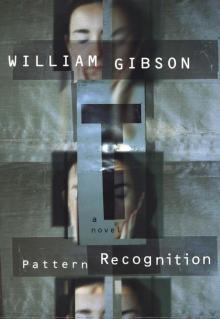 Pattern Recognition
Pattern Recognition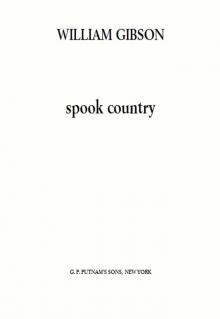 Spook Country
Spook Country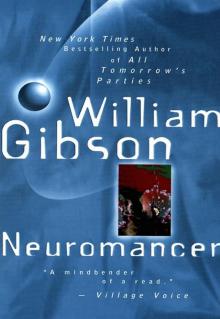 Neuromancer
Neuromancer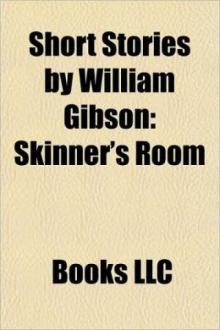 Skinner's Room
Skinner's Room The Difference Engine
The Difference Engine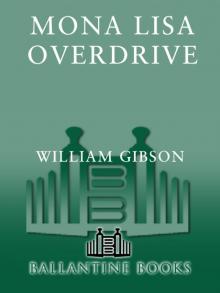 Mona Lisa Overdrive
Mona Lisa Overdrive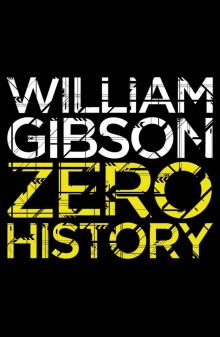 Zero History
Zero History The Peripheral
The Peripheral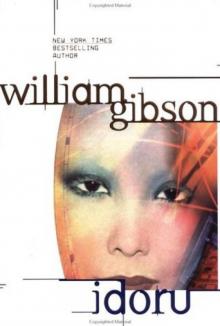 Idoru
Idoru Johnny Mnemonic
Johnny Mnemonic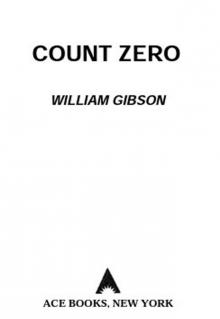 Count Zero
Count Zero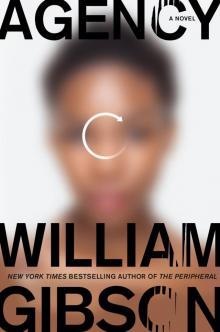 Agency
Agency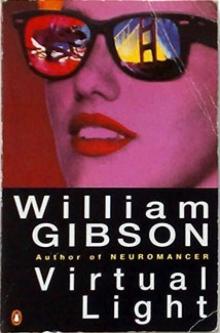 Virtual Light
Virtual Light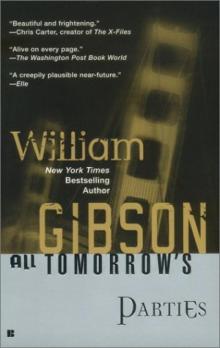 All Tomorrow's Parties
All Tomorrow's Parties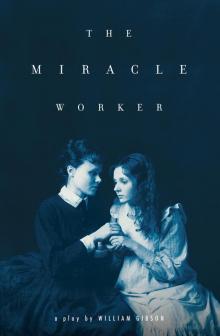 The Miracle Worker
The Miracle Worker Disneyland with the Death Penalty
Disneyland with the Death Penalty Idoru tb-2
Idoru tb-2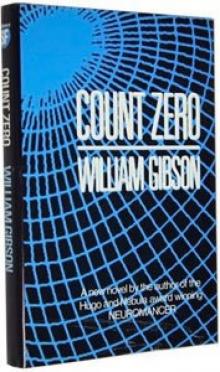 Count Zero s-2
Count Zero s-2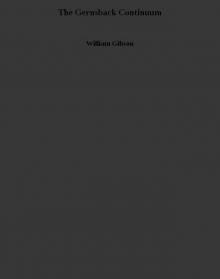 The Gernsback Continuum
The Gernsback Continuum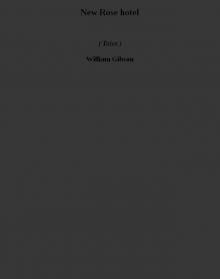 New Rose hotel (tales)
New Rose hotel (tales)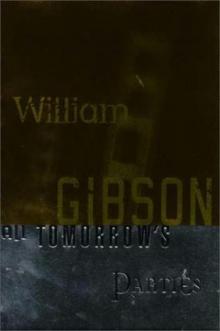 All Tomorrow's Parties bt-3
All Tomorrow's Parties bt-3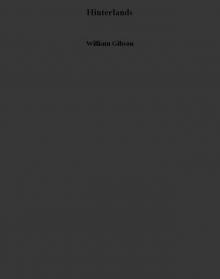 Hinterlands
Hinterlands Thirteen Views Of A Cardboard City
Thirteen Views Of A Cardboard City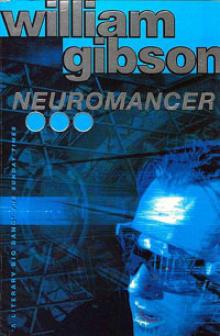 Neuromancer ts-1
Neuromancer ts-1 Virtual light b-1
Virtual light b-1